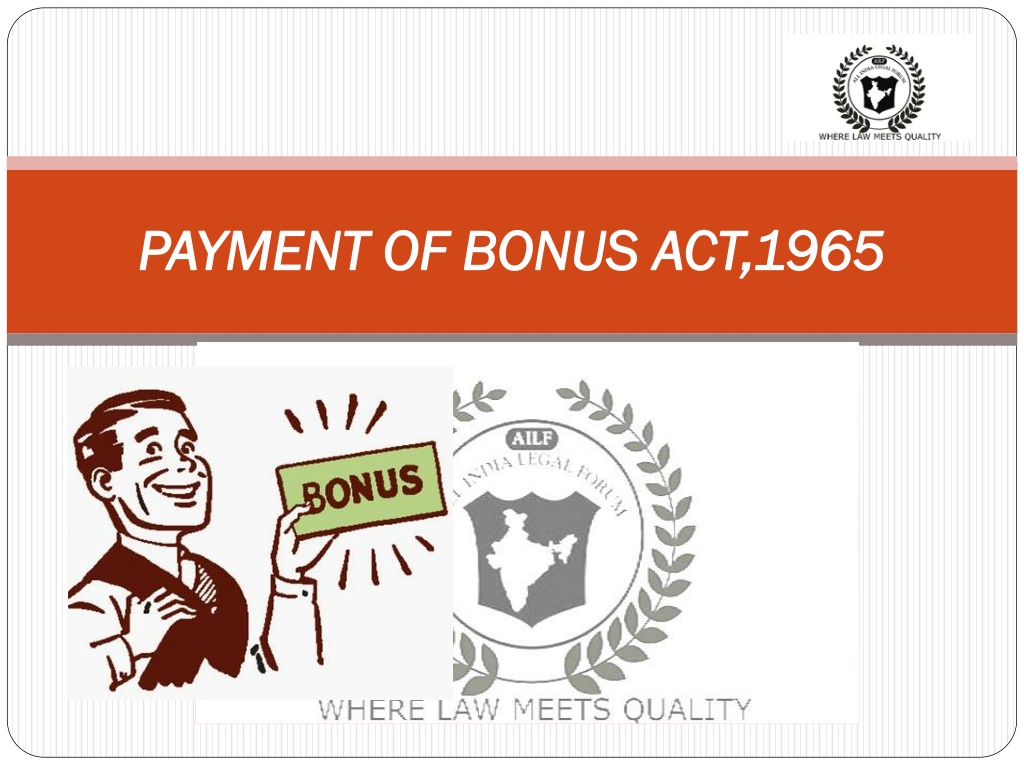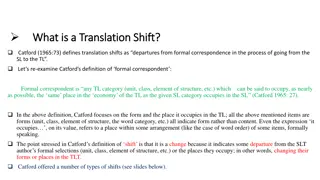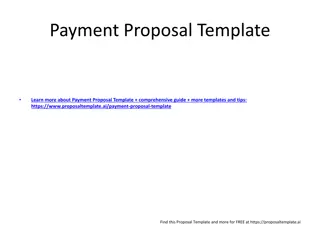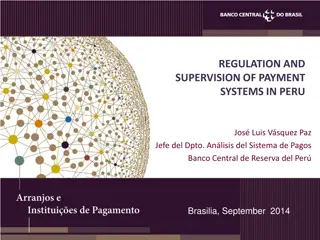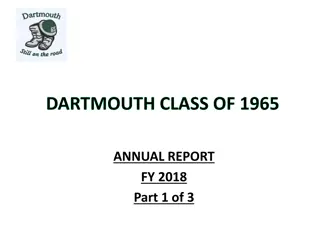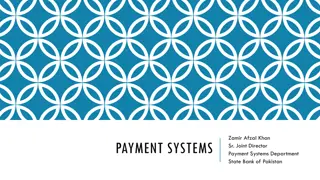Overview of Payment of Bonus Act, 1965 in India
The Payment of Bonus Act, 1965 in India regulates the payment of bonus to employees based on profits and productivity. It imposes legal responsibility on employers to pay bonuses and provides guidelines for calculation, minimum and maximum percentages, and redressal mechanisms. Applicable to establishments with 20 or more workers, the Act aims to ensure fair bonus distribution.
Download Presentation

Please find below an Image/Link to download the presentation.
The content on the website is provided AS IS for your information and personal use only. It may not be sold, licensed, or shared on other websites without obtaining consent from the author. Download presentation by click this link. If you encounter any issues during the download, it is possible that the publisher has removed the file from their server.
E N D
Presentation Transcript
PAYMENT OF BONUS ACT,1965 PAYMENT OF BONUS ACT,1965
INTRODUCTION The practice of bonus in India appears to have originated during WW1 when certain textile mills granted 10% wages as war bonus to their workers in 1917. In certain cases of Industrial disputes demand for payment of bonus was also included. In 1950, the Full Bench of the Labour Appellate Tribunal evolved a formula for determination of bonus, A please was made to raise that formula in 1959 At the second and third meetings of the 18thsession of Standing Labour Committee (G.O.I) held in New Delhi in March /April 1960, it was agreed that a commission be appointed to go into the question of bonus and evolve suitable norms.
CONTINUED A Tripartite Commission was set up by the G.O.I to consider in comprehensive manner, the question of payment of bonus based on profits to employees employed in establishments and to make recommendations to the Government. The Government of India accepted the recommendation of the Commission subject to certain modifications. The payment of Bonus Ordinac,1965, was promulgated on 29thMay,1965. to replace the said ordinance the Payment of Bonus Bill was introduced in the parliament.
DEFINITION OF BONUS According to New English Dictionary- A boon or gift over and above what is normally due as remuneration to the receiver and which is, holy to the good. 'Bonus' is something to the good; especially extra dividend to the shareholders of the company; distribution of profits to the insurance policyholders
OBJECTIVES OF PAYMENT OF BONUS ACT,1965 It aims to regulate the amount of bonus to be paid to the persons employed in establishments based on its profit and productivity. To impose a legal responsibility upon the employer of every establishment covered by the Act to pay the bonus to employees. To designate the minimum and maximum percentage of bonus. To prescribe the formula for calculating bonus. To provide redressal mechanism.
APPLICABILITY OF PAYMENT OF BONUS ACT,1965 Under section 1 of the Act, it is specified that the Payment of Bonus Act is applicable to the whole of India. It applies to any factory or establishment which had twenty or more workers employed on any day during the year. The act does not apply to the non-profit making organisations. It is not applicable to establishments such as LIC, hospitals which are excluded under Section 32. It is not applicable to establishments where employees have signed an agreement with the employer. It is not applicable to establishments exempted by the appropriate government like sick units. According to the Bonus Act, any different departments or undertakings or branches of an establishment of whether located in the same place or at different areas should be considered as parts of the similar establishment for computation of bonus under the Act..
ELIGIBILTY Section 8: Every employee receiving salary or wages up to Rs.21,000 p.m. engaged in any kind of work whether skilled, unskilled, managerial, manual, supervisory, administrative, technical or clerical work for hire or reward etc. is entitled to bonus for every accounting year, whether the terms of employment be express or implied, only if he has worked for at least 30 working days in that year [Section 2(10)]. Section 2(13) defines Employee . Section 32-Act not to apply to certain classes of employees employed by : Employees of the general insurance companies, LIC, Central/State Government establishments, Indian Red Cross Society, Universities and Educational Institutions, Hospitals, Chambers of Commerce, Reserve Bank of India, Industrial Finance Corporation of India, Unit Trust of India, And all other Financial Corporation established under Section 3, or any Joint Financial Corporation established under Section 3- A, of the State Financial Corporations Act, 1951, Social Welfare Institutions, Local Bodies, etc. are not entitled to bonus under the Act. What they are paid as Bonus, is Ex-gratia payment. Section 2 (13) Apprentice is not eligible for Bonus. Bonus is payable only annually and it cannotbe directed to be paid on half-yearly basis. When an employee is not eligible for the statutory bonus but the company wants to share bonus, it can be given as ex-gratia.
AN EMPLOYEE IN THE FOLLOWING CASES IS ALSO ENTITLED TO BONUS: (1) A temporary workman on the basis of total number of days worked by him. (2) An employee of a seasonal factory is entitled to proportionate bonus and not minimum bonus, as prescribed by the Act. (3) A part-time employee, as a sweeper engaged on a regular basis. (4) A retrenched employee, provided he has worked for minimum qualifying period. (5) A probationer is an employee and as such is entitled to bonus. (6) A dismissed employee re-instated with back wages is entitled to bonus. (7) A piece rated worker is entitled to bonus. Section 16. SPECIAL PROVISIONS WITH RESPECT TO CERTAIN ESTABLISHMENTS: The newly set up (whether before or after the commencement of this Act) establishment is exempted from paying bonus to its employees in the first 5 years following the year in which the employer sells the goods produced or manufactured by him. If, however, the employer derives profit in any of the first 5 years, he has to pay bonus for that year. The provision of set on and set off are not applicable in such cases. sub-section (1), an establishment shall not be deemed to be newly set up merely by reason of a change in its location, management, name or ownership
Section 9- DISQUALIFICATION FOR BONUS: An employee shall be disqualified from receiving bonus, if he is dismissed from service for fraudor riotous or violent behaviour while in the premises of the establishment or theft, misappropriation or sabotage of any property of the establishment. Section 10- MINIMUM BONUS: The minimum bonus which an employer is required to pay even if he suffers losses during the accounting year or there is no allocable surplus (except in case of new establishments), is 8.33% of the salary or wages of the employee during the accounting year. Rs. 100 in case of employees above 15 years and Rs. 60 in case of employees below 15 years. Whichever is higher. MAXIMUM BONUS: If in any accounting year, the allocable surplus exceeds the amount of minimum bonus, the employer shall pay bonus in proportion to the salary or wages earned by the employee during that accounting year, subject to maximum of 20% of such salary or wages. Section 22- MODE AND TIME FOR PAYMENT Bonus should be paid in Cash and within 8 months from the close of the accounting year. Bonus is payable only annually. Since the financial year in India ends in March, payments have to be made by the end of November of the next financial year.
EMPLOYERS OBLIGATIONS: To calculate and pay the annual bonus as required under the Act To submit an annul return of bonus paid to employees during the year, in Form D, to the Inspector, within 30 days of the expiry of the time limit specified in section-19 for payment of bonus. To co-operate with the Inspector, produce before him the registers/records maintained, and such other information as may be required by them (allocable surplus; set-on and set-off of the allocable surplus; details of the amount payable as bonus, amount of deduction and actual amount paid to the employees). To get his account audited as per the directions of a Labour Court/Tribunal or of any such other authority. EMPLOYERS RIGHTS: Right to forfeit bonus of an employee, who has been dismissed from service for fraud, riotous or violent behaviour, or theft, misappropriation or sabotage of any property of the establishment. Right to make permissible deductions from the bonus payable to an employee, such as, festival/interim bonus paid and financial loss caused by misconduct of the employee. Right to refer any disputes relating to application or interpretation of any provision of the Act, to the Labour Court or Labour Tribunal.
RIGHTS OF EMPLOYEES: 1. Right to claim bonus payable under the Act and to make an application to the Government, for the recovery of bonus due and unpaid, within one year of its becoming due. 2. Right to refer any dispute to the Labour Court/Tribunal Employees, to whom the Payment of Bonus Act does not apply, cannot raise a dispute regarding bonus under the Industrial Disputes Act. 3. Right to seek clarification and obtain information, on any item in the accounts of the establishment. Section13- PROPORTIONATE REDUCTION IN BONUS IN CERTAIN CASES: Where an employee has not worked for all the working days in an accounting year, the minimum bonus of one hundred rupees or, as the case may be, of sixty rupees, if such bonus is higher than 8.33 per cent of his salary or wage for the days he has worked in that accounting year shall be proportionately reduced. Note- It is open to any employer to pay bonus linked with production or productivity instead of bonus based on profits, if there is an agreement to that effect between him and his employees, but subject to the provisions of the Act in respect of payment of minimum and maximum basis. (Section-31 A).
TIME LIMIT FOR PAYMENT Time limit for payment is specified in Section 19 of the Payment of Bonus Act, 1965. Section 19. Time-limit for payment of bonus [All amounts] payable to an employee by way of bonus under this Act shall be paid in cash by his employer,- (a) where there is a dispute regarding payment of bonus pending before any authority under section 22, within a month from the date on which the award becomes enforceable or the settlement comes into operation, in respect of such dispute; (b) in any other case, within a period of eight months from the close of the accounting year.
CONTINUED PROVIDED that the appropriate government or such authority as the appropriate government may specify in this behalf may, upon an application made to it by the employer and for sufficient reasons, by order, extend the said period of eight months to such further period or periods as it thinks fit; so, however, that the total period so extended shall not in any case exceed two years.
KEY POINTS The bonus should be paid in cash within one month from the date of enforcement of the award or coming into operation of a settlement following an industrial dispute regarding payment of bonus. Or, within 8 months from the close of the accounting year. However if there is sufficient cause extension may be applied for. 1. 2. 3.
PENALTIES AND OFFENCES Penalty Penalties are dealt with in Section 28 of the Payment of Bonus Act, 1965 28. Penalty. If any person a) contravenes any of the provisions of this Act or any rule made thereunder; or b) to whom a direction is given or a requisition is made under this Act fails to comply with the direction or requisition, he shall be punishable with imprisonment for a term which may extend to six months, or with fine which may extend to one thousand rupees, or with both.
CONTINUED... Offences Offences are dealt in Section 29. 29. Offences by companies (1) If the person committing an offence under this Act is a company, every person who, at the time the offence was committed was in charge of, and was responsible to, the company for the conduct of business of the company, as well as the company, shall be deemed to be guilty of the offence and shall be liable to be proceeded against and punished accordingly: PROVIDED that nothing contained in this sub-section shall render any such person liable to any punishment if he proves that the offence was committed without his knowledge or that he exercised all due diligence to prevent the commission of such offence.
CONTINUED (2) Notwithstanding anything contained in sub-section (1), where an offence under this Act has been committed by a company and it is proved that the offence has been committed with the consent or connivance of, or is attributable to any neglect on the part of, any director, manager, secretary or other officer of the company, such director, manager, secretary or other officer shall also be deemed to be guilty of that offence and shall be liable to be proceeded against and punished accordingly. Explanation : For the purposes of this section,- (a) "company" means any body corporate and includes a firm or other association of individuals; and (b) "director" in relation to a firm means a partner in the firm.
CALCULATION OF BONUS 1) Calculate the statutory bonus- Meaning- statutory bonus means bonus payable as per the statute, i.e., the Payment of Bonus Act, as per the act, an amount equal to 8.33% of the Basic+ Dearness allowance paid to an employee who is eligible for bonus is to be paid irrespective of availability of surplus or profit. The Payment of Bonus Act, 1965 gives to the employee a statutory to share in the profits of his employer. Calculation- according to The Payment of bonus Act all the confirmed employees whose basic salary is less than or equal to Rs. 7,000 per month is eligible for statutory bonus @ of 8.33% of Basic pay but the act also puts a ceiling on the bonus and the maximum bonus payable under the act is equivalent to about 2 months salary or wages ( 20% of annual earnings). Where the salary or wage of an employee exceeds Rs. 7,000 per month, or the minimum wage for the scheduled employment , as fixed by the appropriate government whichever is higher the bonus payable to such an employee under section 10 or as the case maybe section 11 shall be calculated as if the salary or wage were Rs. 7000 or the minimum wage for the scheduled employment, whichever is higher. ( As amended W.e.f 1.4.2014)
EXAMPLE SITUATION A- where the basic salary of the employee is less than or equal to Rs. 7000 Q. If Rohan has a basic salary of Rs. 5000 per month then calculate bonus per month and per annum Ans. Basic salary*8.33%= Bonus per month 5000*8.33% = Rs.416.5 per month * 12= Rs. 4,998 per annum SITUATION B- where the basic salary of the employee is higher than Rs. 7000 Q. If Rohan has a basic salary of Rs. 15,000 per month then calculate bonus per month & per annum Ans. Basic salary*20%= Bonus per month 7000*20% = Rs. 1,400 per month*12= Rs. 16,800 SITUATION C- where the basic salary of the employee is higher than Rs. 21,000 Ans. There is no bonus applicable to employees having a basic salary of more than Rs 21,000
2) CALCULATE THE AVAILABLE SURPLUS Available Surplus= Gross profit[as per sec 4] (- )Depreciation admissible under Sec 32 of the income tax act (-) Development allowance. Calculate the gross profit in the manner specified in First schedule, in case of banking company or second schedule, in any other case. FORMULA OF AVAILABLE SURPLUS i. Direct taxes payable for the accounting year ( calculated as per sec 7)- sums specified in third schedule. ii. Direct taxes ( calculated as per sec 7) in respect of gross profit for the immediately preceding accounting year. iii. Allocable surplus = 60% of available surplus, 67% in case of banking companies. iv. Make adjustment for set on and set off for calculating the amount of bonus in respect of an accounting year.
ALLOCABLE SURPLUS The bonus is to be paid out of the allocable surplus. The allocable surplus so computed is distributed amongst the employees in proportion to salary or wages received by them during the relevant accounting year. In case of Banking company, the allocable surplus is 67 percent of the available surplus and in other cases it is 60 percent ( section 4,5 and 7)
WHO IS ENTITLED TO BONUS UNDER THE PAYMENT OF BONUS ACT, 1965 A temporary workman on the basis of total number of days worked by him. An employee of a seasonal factory is entitled to proportionate bonus and not minimum bonus as prescribed by the act. A part time employee, as a sweeper engaged on a regular basis. ( ex Automobile Karamchari sangh vs industrial tribunal) A retrenched employee provided he has worked for a minimum qualifying period.(ex- East Asiatic P ltd. Vs industrial tribunal 1961) A probationer is an employee and as such is entitled to bonus.( ex- Bank mudra Ltd v Employee s Union, 1970) A dismissed employee re instated with back wages is entitled to bonus.(ex- Gammon India ltd v Niranjan das 1984) A piece rated worker is entitled to bonus (ex- Mathuradas Kani v L.A. tribunal
THANK YOU! By- Apalka Bareja
